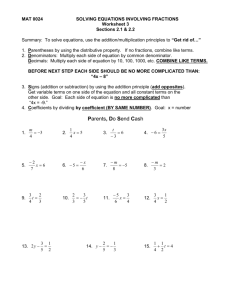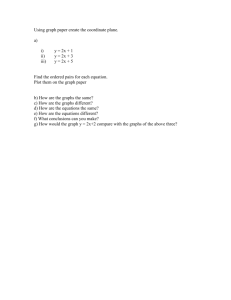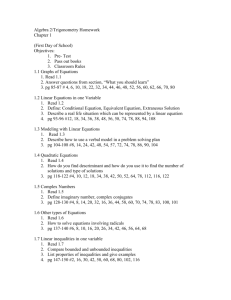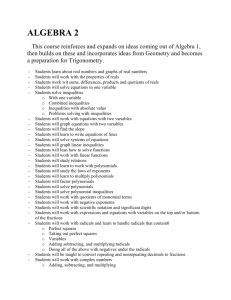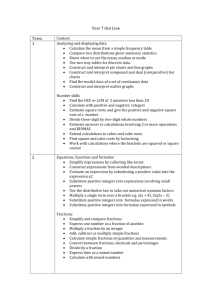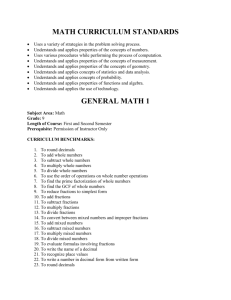Mr. Brown`s Year Long Curriculum Map for 7th Grade Pre
advertisement
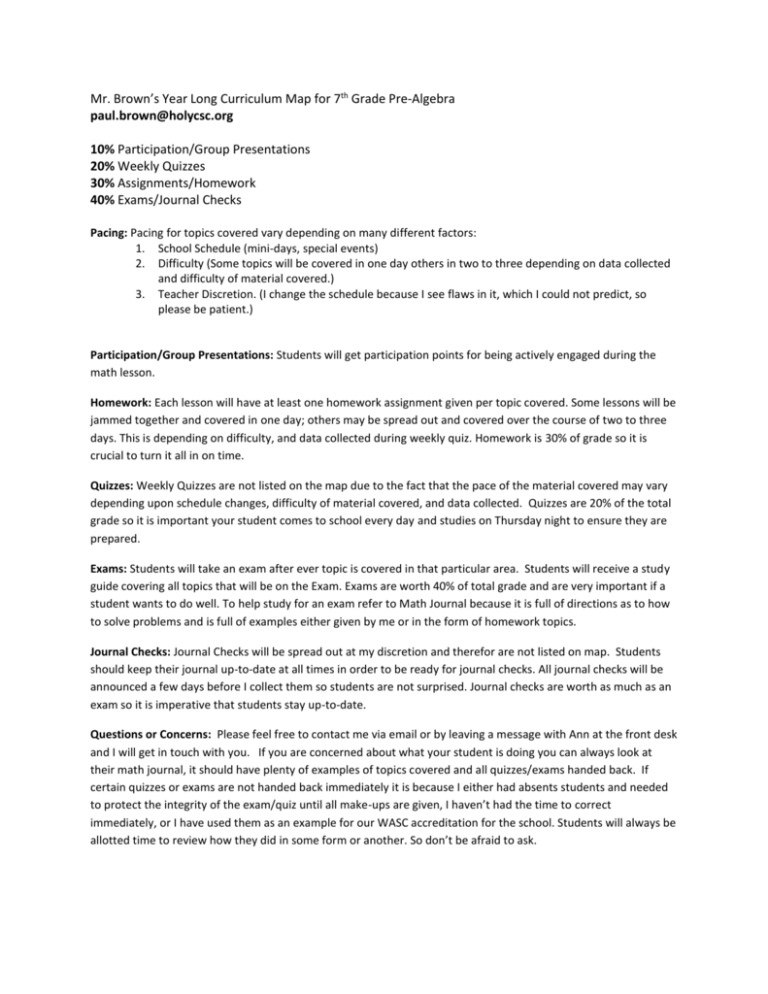
Mr. Brown’s Year Long Curriculum Map for 7th Grade Pre-Algebra paul.brown@holycsc.org 10% Participation/Group Presentations 20% Weekly Quizzes 30% Assignments/Homework 40% Exams/Journal Checks Pacing: Pacing for topics covered vary depending on many different factors: 1. School Schedule (mini-days, special events) 2. Difficulty (Some topics will be covered in one day others in two to three depending on data collected and difficulty of material covered.) 3. Teacher Discretion. (I change the schedule because I see flaws in it, which I could not predict, so please be patient.) Participation/Group Presentations: Students will get participation points for being actively engaged during the math lesson. Homework: Each lesson will have at least one homework assignment given per topic covered. Some lessons will be jammed together and covered in one day; others may be spread out and covered over the course of two to three days. This is depending on difficulty, and data collected during weekly quiz. Homework is 30% of grade so it is crucial to turn it all in on time. Quizzes: Weekly Quizzes are not listed on the map due to the fact that the pace of the material covered may vary depending upon schedule changes, difficulty of material covered, and data collected. Quizzes are 20% of the total grade so it is important your student comes to school every day and studies on Thursday night to ensure they are prepared. Exams: Students will take an exam after ever topic is covered in that particular area. Students will receive a study guide covering all topics that will be on the Exam. Exams are worth 40% of total grade and are very important if a student wants to do well. To help study for an exam refer to Math Journal because it is full of directions as to how to solve problems and is full of examples either given by me or in the form of homework topics. Journal Checks: Journal Checks will be spread out at my discretion and therefor are not listed on map. Students should keep their journal up-to-date at all times in order to be ready for journal checks. All journal checks will be announced a few days before I collect them so students are not surprised. Journal checks are worth as much as an exam so it is imperative that students stay up-to-date. Questions or Concerns: Please feel free to contact me via email or by leaving a message with Ann at the front desk and I will get in touch with you. If you are concerned about what your student is doing you can always look at their math journal, it should have plenty of examples of topics covered and all quizzes/exams handed back. If certain quizzes or exams are not handed back immediately it is because I either had absents students and needed to protect the integrity of the exam/quiz until all make-ups are given, I haven’t had the time to correct immediately, or I have used them as an example for our WASC accreditation for the school. Students will always be allotted time to review how they did in some form or another. So don’t be afraid to ask. Integer Operations Expression and Order of operations Integers and the Number Line Adding Integers Positive and Negative Subtracting Integers Positive and Negative Multiplying Integers Positive and Negative Dividing Integers Positive and Negative Number Properties Addition and Subtraction Properties Distributive Property Exam on Integer Operations Rational Number Operations Simplifying Fractions Comparing Fractions and Mixed Numbers Adding and Subtracting Fractions Using Common Denominator Multiplying Fractions Dividing Fractions Rational Numbers in Decimal form Exam on Rational Number Operations Decimals and Percent Adding and Subtracting Decimals Multiplying and Dividing Decimals Percent as Decimals and Fractions Decimals and Fractions as Percent Discounts, Markups, Commissions and Profit Percent of Change Simple Compound Interest Exam on Decimals and Percent Exponents and Irrational Numbers Integer Powers of Ten Scientific Notation Zero and Negative Exponents Finding and Approximating Square Roots Simplifying Square Roots Rational and Irrational Numbers Exam on Exponents and Irrational Numbers Solving Equations and Inequalities Writing and Evaluation Expressions Simplify Expressions Solving Equations Using Addition or Subtraction Solving Equation using Multiplication or Division Solving Two Step Equations Writing and Solving Proportions Solving Inequalities Using Addition or Subtraction Solving Inequalities Using Multiplication or Division Solving Two Step Inequalities Exam Solving Equations and Inequalities Linear Equations and Graphs Equations it Two Variables Graphs of Linear Equations Using Intercepts Slope-Intercept Form Direct Variation Graphs of Linear Inequalities Systems of Equations and Inequalities Exam on Equations and Graphs Exponents and Non Linear Functions Exponent Properties Involving Products Exponent Properties Involving Quotients Products, Quotients, and Roots of Monomials Nonlinear Functions Exam on Exponents and Non Linear Functions Measurements and Planar Figures Comparing and Converting Measurements Measures Involving Products and Quotients Multi-Step Conversations Segment and Angle Bisectors Triangles and Their Areas The Pythagorean Theorem and Its Converse Quadrilaterals and Their Areas Circumferences and Areas of Circles Exam on Measurements and Planar Figures Congruence and Similarity Congruent and Similar Figures Translations in Coordinate Reflections in the Coordinate Plane Dilation in the Coordinate Plane Scale Drawings and Models Exam on Congruence and Similarity Surface Area and Volume Lines and Planes Three-Dimensional Figures Surface Areas of Pyramids and Cones Volumes of Prisms and Cylinders Volumes of Pyramids and Cones Similar Solids Exam on Area and Volume Data Displays Mean, Median, Mode and Range Bar Graphs and Circle Graphs Frequency Tables and Histograms Stem-and –Leaf Plots Box-and-Whisker Plots Exam on Data Displays Polynomials Polynomials Adding and Subtracting Polynomials Multiplying Binomials Exam on Polynomials 75 Total Concept

